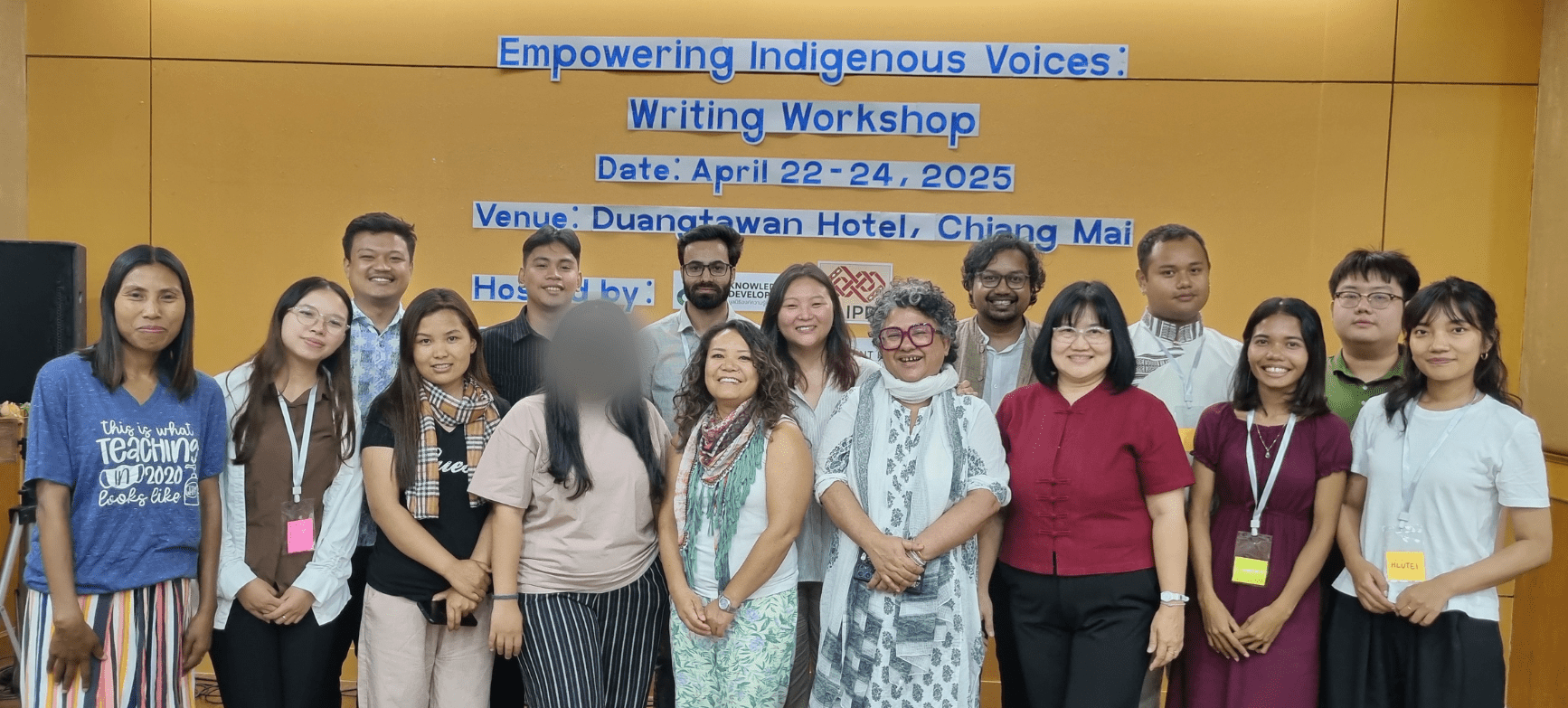The Empowering Indigenous Voices: Writing Workshop 2025, held from April 22–24 in Chiang Mai, Thailand, convened a diverse group of Indigenous journalists from South and Southeast Asia. This collaborative effort, organized by the Asian Indigenous Peoples’ Pact (AIPP) and the Knowledge for Development Foundation (K4D); supported by the East-West Management Institute’s Open Development Initiative (EWMI-ODI), aimed to enhance participants’ writing skills and develop ethical reporting guidelines tailored to Indigenous communities in the region.
State of Indigenous Media
Indigenous journalists are key to shaping the narratives of their communities, but their voices remain marginalized in mainstream media across Asia and the world. In addition, Indigenous journalists face extra challenges—such as censorship, political repression, lack of funding, threats to their safety, lack of representation, and linguistic barriers. Therefore, there is a real need for media entities, governments, funders, and civil society to holistically address these issues through policy and regulation, capacity building, funding and institutional support, protection and safety, decolonizing journalism and strengthening networks.
This collaborative initiative is a key step in tackling the challenges and opportunities for existing and new Indigenous journalists by connecting, training and supporting them in their paths and work.
The workshop was a demonstration of how work can be done to be bring together a diverse group of Indigenous writers, journalists and creative content practitioners to spark critical conversations and engagement about writing long form narratives that hold true to the lived realities and worldviews of so many indigenous communities who continue to be divested of self-determination rights.
“This workshop opened my eyes to the true power of storytelling. I gained practical skills in storytelling, ethical representation and community engagement that are essential for impactful work in media, research and cultural documentation. It empowered me to represent indigenous voices and rights with more confidence.” – Aitizya Chakma, Chakma Indigenous community in Bangladesh
Training and Skill Development
Esteemed trainers Akash Poyam and Makepeace Sitlhou, both well on their way to becoming varisht adivasi patrakars (distinguished Indigenous journalists), led the curriculum, supported by guest speakers Roman Gautam, Editor of Himal Southasian, and Sagar Choudhary, Staff Writer at The Caravan. The sessions delved into:
- Storytelling as Resistance: Utilizing narratives to combat the erasure of Indigenous culture, language, and identity.
- Authentic Representation: Ensuring diverse voices within Indigenous communities are accurately portrayed, recognizing their heterogeneity.
- Integrating Community Issues into National Discourse: Strategies for embedding Indigenous concerns into broader discussions on human rights, empowerment, environment, civic rights, and politics.
- Indigenous Standpoint in Reporting: Reflecting on journalists’ positionality and ethical responsibilities.
Field Visit to an Indigenous community
As journalism doesn’t just focus on the tools and techniques but also understanding the subject itself – the communities and issues they face, the group visited an indigenous community.
A highlight of the workshop was a field trip to the Hmong village of Mon Jam in Northern Thailand. Participants engaged in a listening circle with the village elder, who posed a poignant question: “Do you have similar experiences of brutal State suppression in your countries?” The unanimous affirmation from participants underscored the shared challenges faced by Indigenous communities across the region.
Caption: Discussion Circle. Credit: Nina Sangma, International Land Coalition
Mon Jam: A Study in Resistance
Mon Jam is renowned for its breathtaking views of mountains, valleys, and mist-covered landscapes, attracting both locals and tourists. However, beneath this beauty lies a history of struggle for the Hmong people.
In 2022, over 1,500 villagers protested against the planned demolition of five resorts by the Royal Forest Department, accused of encroaching on national forest land. Community leader Ekkarin Natheepraiwan contested these claims, emphasizing that the land had not been sold to developers. Despite facing adverse conditions and threats, the protesters escalated their efforts by petitioning the Royal Palace in Bangkok.
These protests highlight broader issues stemming from policies that centralize land and resource management without community consultation. Law enforcement and park rangers have often employed forceful measures, leading to arrests and surveillance, thereby undermining the fundamental freedoms of Indigenous communities.
Reflections and Moving Forward
The workshop exemplified the power of bringing together Indigenous writers, journalists, and content creators to foster critical conversations and engagement. By focusing on culturally sensitive and impactful storytelling, participants are better equipped to represent the lived realities and worldviews of Indigenous communities.
“The insights I gained from the K4D workshop, such as the representation of Indigenous communities, effective pitching, and sequencing of long-form stories will definitely help me write more compelling pieces and represent my community more accurately. I’m excited to put these skills into practice in my future work.” – “Lalrinhlui Chawngthu, Mizo community from the state of Mizoram in Northeast India
Gratitude is extended to all participants, trainers, guest speakers, and organizers for their dedication and contributions to making the Empowering Indigenous Voices: Writing Workshop 2025 a resounding success.

